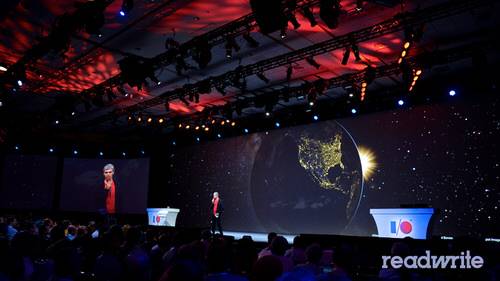
A year ago, I left Google’s annual I/O developers conference convinced it was making a major strategic shift into being a hardware company.
As this year’s I/O wraps up, I’m left questioning that conclusion.
The message Google is putting forward in 2013 is very different: It’s all about what developers can do with the software tools it provides, whether that means broad digital platforms like the Chrome Web browser and the Android mobile operating system, or fungible, ubiquitous services like Google+, YouTube and Google Maps.
A Retreat From Hardware
In 2012, the keynote offered a drumbeat of new hardware: The Nexus 7 tablet! Skydiving Google Glass stuntmen! The confounding, mysterious, ill-fated Nexus Q media device!
(See also: What Google Didn’t Announce At I/O)
The overall effect was to show how Google was pushing the boundaries of industrial design and taking control of the complete user experience, from hardware and software to the services that run on top of them.
Call it a strategic retreat, but we heard almost nothing about hardware this year. The closest Google got was unveiling an unlocked Samsung Galaxy S4 running Google’s preferred version of Android, which it plans to sell directly to consumers online. Contrast that to Google’s past unveilings of Nexus devices, manufactured by partners but branded with the Google logo.
Even Glass, the face-mounted, Internet-connected headset now hitting the market, got sidelined in the keynote. While present at I/O, it wasn’t the emphasis.
Learning A Hard Lesson
Perhaps the disastrous Q—never formally cancelled, merely “postponed”—was the comeuppance Google needed, the failure that brought Larry Page and company to their senses. There’s also the ongoing agonies of Motorola Mobility, the handset manufacturer Google bought last year but continues to hold at arm’s length. That, more than anything, may have taught Google just how hard it is to crack the hardware business.
(See also: The Epic Battle Between Apple And Google Is All But Over)
At recent Google I/O events, the company has handed out hardware to attendees (or units on loan for review to reporters). This year’s giveaway, a Chromebook Pixel, was a little sad: It was hardly new, having been announced in February rather than at this year’s show.
While the Pixel arguably showed off Google’s ChromeOS, a stripped-down operating system focused on apps that run on the built-in Web browser, it’s ultimately just a nicely built laptop—a very familiar category of gadget, hardly the kind of game-changing innovation Google CEO Larry Page talked up at this year’s keynote.
I suspect that Google will retreat further from hardware—perhaps spinning off or selling Motorola, after stripping it of the most essential code and patents it needs for Android.
(See also: Now Google Wants To Kill The Mobile Web (Good Riddance))
Google won’t hesitate to build tools that serve its business, like the custom-designed servers and switches that run its giant empire of data centers, or the Trekker backpack cameras it uses to capture the offroad world for Google Maps. And we’ll likely see hardware from the Google[x] skunk works, like self-driving cars and Google Glass, where there’s nothing off-the-shelf for Google to put its cutting-edge software into.
But smartphones? Tablets? Living-room gadgets? Those are no longer the future of Google. Silicon, Page pointed out, is cheap. It’s software where Google will continue to seek its riches.

















